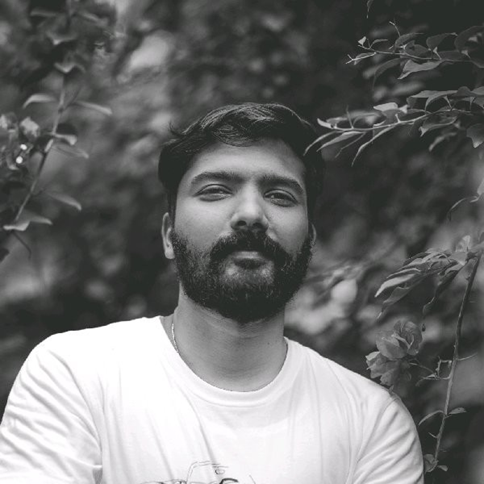Emphasis on Design Thinking and Innovative Mindset - Santosh Kocherlakota

Santosh Kocherlakota graduated from BITS Pilani (Goa, ‘11) is mainly a design thinker, innovator, and entrepreneur, along with many other things. While graduating from the Goa campus in Electronics and Instrumentation, he knew his passion lay in design and innovation, so unlike most students who face the dilemma of an MBA or MS, Santosh had his eyes set on the prestigious design school National Institute of Design, where he pursued the M.desig degree. NID was where he formally honed his design skills, though, he always had a liking for design. Back in BITS, Santosh was a part of various departments, such as the Department of Publicity and Public Relations, where he used to design posters and look after other graphic design requirements. He enjoyed Photoshop more than C programming, unlike most other students on campus.
His main advice to any current student is to break out of the mindset that dictates working for someone, as India is transitioning from a service-based economy to an innovation-based one. Students must look beyond the job-seeking mindset, stop thinking like laborers, and instead focus on innovation and solving real-world problems. Nowadays, every problem has multidisciplinary solutions, so one must look beyond disciplines and concentrate on problem-solving. He emphasizes that learning new tools does not automatically translate to problem-solving; one must look at the bigger picture with an innovative mindset. An innovative mindset is something lacking in our education system, with the industry-to-academia gap ever-increasing. He strongly believes in real-world problem-solving and urges all students to spend time in the real world, discuss with people, find out their problems, and try to solve them instead of picking projects off the internet, thus losing the human aspect of problem-solving.
Santosh always loved sketching cars, especially from his favorite game, Need for Speed. Still, after attending NID, he decided to work on problems that would help other people and chose not to pursue automobile design. His first project was wheelchairs, as, after interacting with consumers, he realized electric wheelchair designs in India needed an upgrade. He was the design lead in conceptualizing and prototyping an affordable, now patented, appropriate electric wheelchair for India. The wheelchair has a unique 3-wheeled architecture and front-powered wheels to tackle the tough Indian urban terrain. About 70% of the wheelchair is made from bicycle parts, thus reducing maintenance costs.
He decided to be more ambitious and do something tougher and bigger, so he co-founded Earthen Tunes Designs. After researching the various problems faced by farmers, he shortlisted about six out of thirty major issues. He decided to start with shoes, where the major challenges were related to tech, craft, and mobility. Lots of farmers still go to work barefoot, which is unsafe and uncomfortable. So Earthen Tunes is designing and manufacturing India's only shoes for farmers.
Instead of using leather or plastic, Santosh decided to look for a local solution and tried to find a natural fiber to synthesize the shoes. After going through multiple viable options for 6 months, he came across a perfect fit, which was indigenous wool known as ghongadi. This material was thermo-regulating, rainproof, and carbon-negative, making it eco-friendly as well as durable. He then learned how to stitch to implement his design. Later, his startup was incubated at IIT Madras, a Rural Technology business incubator. Since then, they have had a target of making 10,000 shoes per year. They tie up with various big companies such as ITC to provide shoes under their CSR model, helping them directly reach the farmers. They partner with NGOs for shoe distribution and awareness. They are still scaling up and looking to expand their production as well as sales, though achieving cost efficiency as well as sustainability is no easy feat.
After seeing various rural issues, he concluded that their solutions lie in our old traditions, and local cultural heritage incorporation is essential in rural problem-solving, through which he has impacted 8000 families and provided a livelihood to 20 weaving clusters. Indian traditions are rooted in sustainability, and these solutions must be found fast as much of India’s traditional knowledge is undocumented and thus endangered. Santosh also works as a professor of design thinking at Woxsen University in Hyderabad. When asked for design thinking lessons, he said, "Don’t ever be afraid to think freely." He posed a simple question - how to get from point A to point B? While most engineers would try to find the most optimal solution, such as by car or cycle and using displacement, a design thinker would not be afraid to answer with ideas like “I will fly using a jetpack.” Design thinking is about thinking freely beyond convention and then finding means to implement the design rather than the other way around. He said the main aspect of any problem is asking the right questions starting with why.
You Might Also Like
- BITS to Baker Hughes: Shad Hussain’s Journey Through Turbulent Times
- Be Cool: Navigating Life, Literature, and Mental Health with Shashi Warrier
- Coaching Across Cultures: Brajesh Bajpai’s Journey of Learning, Leading, and Adapting
- From Engineer to AI Leader: An Interview with Akhil Singhal on Startups, Strategy, and the Future of Gen A
- From Circuits to Capital Markets: Deepak Joshi’s Global Finance Journey














